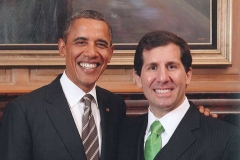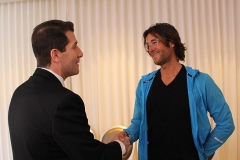Citing a new United Nations University report titled, “The Global E-waste Monitor 2014,” John Shegerian, Chairman and CEO of Electronic Recyclers International (ERI), the nation’s leading recycler of electronic waste, describes the report’s data as an “urgent call to action” for proper and ethical electronic recycling and a warning that the enormous glut of unwanted electronics and e-waste is even more significant than originally estimated by experts.
According to the report, more than 41.8 million metric tons of e-waste were generated in 2014. That’s over 92 billion pounds of unwanted electronics thrown out by people in one year alone. And as Shegerian explains, the trend is growing exponentially.
“A constant need for adapting the latest technology has also become the driving force behind the accumulation of e-waste – the fastest growing sector in the world’s waste stream today,” said Shegerian. “The numbers from this thorough and comprehensive analysis by our friends at United Nations University further prove what we have now been saying for several years. This being Earth Day and Earth Week, people are focused on this issue, but it’s something we have to take very seriously as a long-term problem. The ‘e-waste stream’ is no longer a stream. It is a dangerous tsunami, and the vast majority of individuals, businesses and governments are still not sure what to do with it. Fortunately, effective recycling – when done properly – is proving to be the solution.”
“There is of course, tremendous room for improvement still,” added Shegerian, citing the study’s findings that the amount of gold found in e-waste each year is equivalent to 11 percent of the amount of gold produced in mines each year. “So we’re missing out on recovering economically valuable materials. Worse, an unethical underground economy has sprung up around international e-waste dumping grounds with scarce or no regulatory oversight. An unfortunately large number of organizations, here in the United States even, don’t recycle ethically or responsibly. It is more urgent than ever before to make sure your recycler is certified so that your electronics are properly dismantled, your data is effectively destroyed and all safety and environmental standards are met.”
In its report, the United Nations University also noted only 15 percent of e-waste produced is properly recycled, meaning most of the electronic detritus gets dumped without meeting pollution and waste standards.
Earlier this year, and with an eye toward global solutions for the e-waste crisis, ERI hosted and helped train guests from around the world as part of the United Nations University’s “Person in Port” program in conjunction with the United States Environmental Protection Agency (EPA) and the Basel Convention Coordination Centre for Africa (BCCC) in Nigeria. These organizations are teaming with ERI to learn best practices in the effective and safe dismantling of e-waste, while also gathering information and reliable data on the import of used electronics and e-waste into Nigeria, one of the main countries through which electronic waste flows.



















